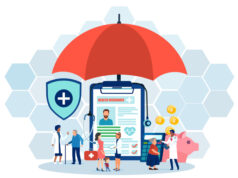Stacy Feld (center), head of Johnson & Johnson Innovation for West North America, and Sandi Colner (left), director of lab and life sciences for Intel, shared what they see as critical to success for digital health companies at a panel hosted by W20. Technology analyst Mike Feibus (right) moderated the panel.
Digital health companies have caught the eye of prominent corporate VCs. But funding rounds aside, they’ve still struggled to gain traction in a risk-averse industry. Audience members at a panel during J.P. Morgan Healthcare asked, will it take a marriage of the technology and pharmaceutical industries for them to succeed?
“So many companies today aren’t just life science companies or technology companies. They’re some combination of the two,” said Stacy Feld, head of Johnson & Johnson Innovation for West North America, Australia and New Zealand. She manages J&J’s investments in everything from traditional pharma startups to up-and-coming medical device companies.
For example, J&J led a $25 million funding round in Carrot, a digital health startup with a smoking cessation program. It uses a carbon monoxide breath sensor to communicate with users how smoking affects their lung health. As they smoke cigarettes less, the levels of carbon monoxide decrease.
More recently, J&J led a $7 million investment in Berlin-based company Cara Care, which helps patients with gastrointestinal conditions, such as irritable bowel syndrome. The company’s software explores how users’ mood or lifestyle might affect their condition and gives them access to nutritionists.
Instead of waiting on a physician to pick from the myriad digital health solutions, Feld sees patients taking a bigger role in the future.
“I think that so often we look to the physician to navigate these technologies,” she said. “We’re seeing really a hunger and an opportunity to empower consumers to navigate their own health.”
Of course, many health conditions cannot be treated by an app alone. That gives digital health companies an opportunity to work with pharmaceutical partners. For example, in cases where medication might be needed to treat a GI condition, Cara Care has explored ways to wrap its software around that, Feld said.
Getting consumers to use digital health solutions isn’t the only challenge companies face. The industry also faces challenges in collecting data, organizing it and protecting it.
“This problem is hard. It’s so much easier said than done with this regulatory environment, with privacy and security issues,” said Sandi Colner, director of lab and life sciences for Intel Corp.
Colner was named head of Intel’s life sciences segment in April. Prior to joining Intel, she worked for Abbott and Johnson & Johnson. From her perspective, digital health companies need access to good, structured datasets, where apples-to-apples comparisons can be made. Getting that data is a challenge, she said, but it’s getting easier.
“The data is becoming accessible. It’s digestible. It’s immediate,” she said. “It’s going to become probably part of our regular visits. What we do with that data and how we interpret it, I’m interested to see.”
In the long run, she sees the key to success in closer collaboration between traditional tech companies and the healthcare industry.
“I think that we need to come together to bring the best that both industries have to offer,” she said. “I think we need to start simply. We need to start solving problems and get that snowball effect. … That’s one of the things I hope for in 2020 and beyond.”
Photo credit: Elise Reuter








